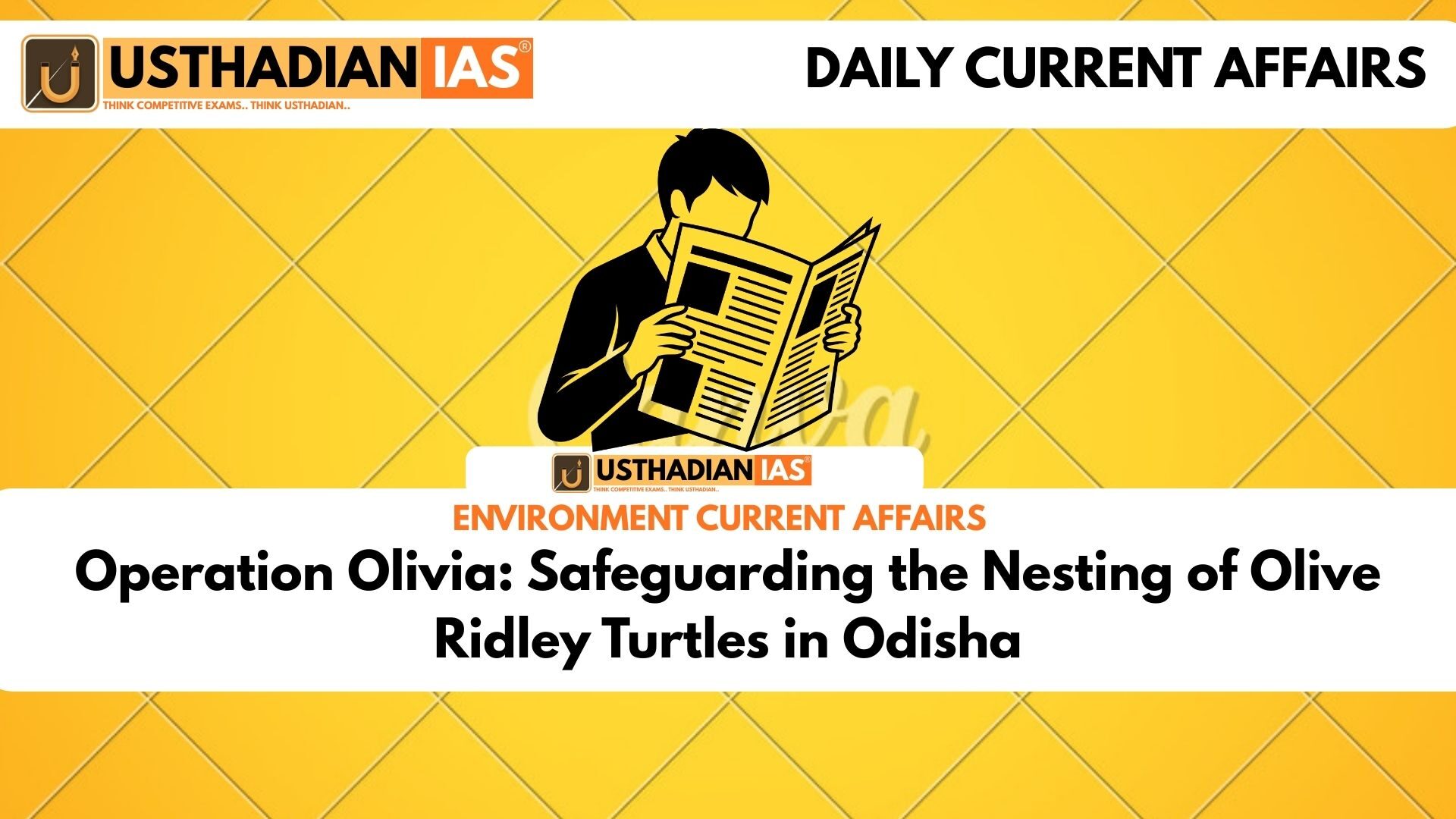What is Operation Olivia?
Operation Olivia: Safeguarding the Nesting of Olive Ridley Turtles in Odisha: Launched in the early 1980s, Operation Olivia is the Indian Coast Guard’s annual initiative aimed at protecting the endangered Olive Ridley turtles during their nesting season along the Odisha coast. These turtles visit Indian shores, especially the Rushikulya river mouth, Devi river mouth, and Gahirmatha Beach, in large numbers between November and May to lay their eggs. The operation aims to ensure safe nesting conditions, prevent illegal fishing activities, and regulate marine traffic in sensitive zones.
In the 2025 season, Operation Olivia marked a milestone by protecting over 6.98 lakh Olive Ridley turtles at the Rushikulya river mouth, one of the largest turtle nesting congregations in the world.
Olive Ridley Turtle: The Vulnerable Marine Migrant
Olive Ridley turtles (Lepidochelys olivacea) are the smallest and most abundant sea turtle species, named for their distinctive olive-colored, heart-shaped shells. Despite their numbers, they are classified as Vulnerable under the IUCN Red List due to various anthropogenic threats.
These turtles are famed for their arribada—a phenomenon where thousands of females simultaneously come ashore for nesting. They travel thousands of kilometers across the Indian, Pacific, and Atlantic Oceans, demonstrating incredible migratory strength and navigational precision. In India, Odisha remains a major nesting site, along with parts of the Andaman Islands.
Threats to Olive Ridley Turtles
While the species is biologically resilient, it faces multiple threats. Illegal trawling and bycatch in fishing nets are primary causes of death, as turtles often drown when trapped underwater. Other risks include coastal development, plastic pollution, poaching of eggs, and rising sea levels due to climate change, which erodes nesting beaches. Flashlights and loud noises near nesting areas also disturb the turtles’ natural behavior.
To mitigate these, the Indian Coast Guard conducts night patrolling, aerial surveillance, and coordinates with forest and fisheries departments during the operation.
Conservation Measures and Legal Protection
The Olive Ridley turtle enjoys legal protection under multiple frameworks:
- Wildlife Protection Act, 1972 – Schedule I (Highest protection)
- IUCN Red List – Vulnerable
- CITES – Listed in Appendix I, banning international trade
These protections ensure that both nesting grounds and turtle populations receive the highest level of governmental and international oversight.
Operation Olivia’s Growing Impact
Apart from patrolling, Operation Olivia focuses on community awareness, urging local fishermen to use Turtle Excluder Devices (TEDs) and avoid no-fishing zones during the breeding season. The Indian Coast Guard also issues navigational warnings and conducts joint exercises with state agencies to regulate coastal activity.The operation’s success at Rushikulya demonstrates the effectiveness of science-led conservation paired with strong enforcement. As turtle conservation becomes a global concern, India’s proactive measures through Operation Olivia offer a model for balancing marine biodiversity with coastal livelihoods.
STATIC GK SNAPSHOT
| Topic | Details |
| Launched | Early 1980s |
| Coordinating Agency | Indian Coast Guard |
| 2025 Impact | Protected 6.98 lakh Olive Ridley turtles at Rushikulya |
| Major Nesting Sites | Gahirmatha, Rushikulya, Devi River Mouth (Odisha), Andamans |
| Legal Status | WPA 1972 (Schedule I), IUCN (Vulnerable), CITES (Appendix I) |
| Phenomenon | Arribada (Mass nesting) |








